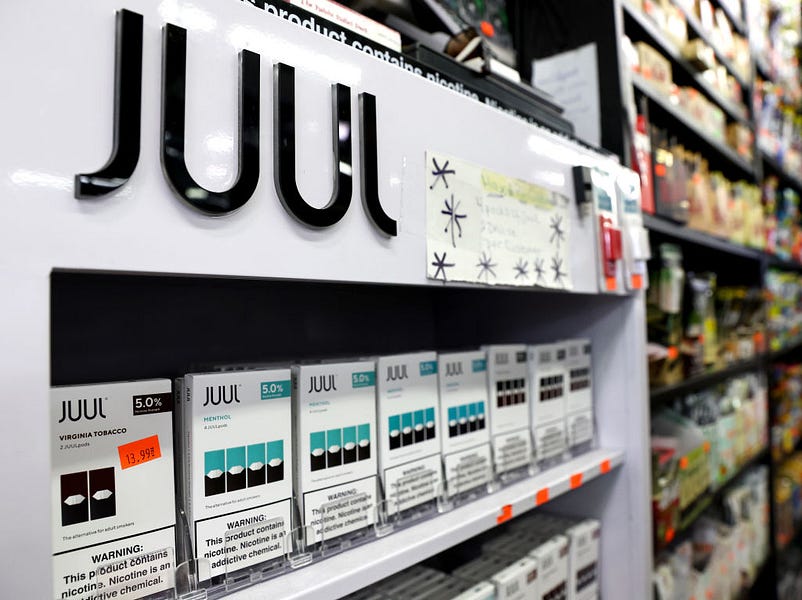The Food and Drug Administration has been taking steps to prohibit underage smoking and nicotine use for years—notably banning fruity flavors for Juul vapes in 2020—but its attempt to effectively ban Juul Labs from manufacturing and distributing vaping devices in June is a signal of just how serious the Biden administration’s campaign against e-cigarette companies is. Juul products are available for now—a federal court blocked the FDA ban one day after it was issued—but the battle is far from over.
The FDA’s targeting of the tobacco industry, and subsequently the e-cigarette market, is nothing new. The American Lung Association drove momentum for anti-smoking legislation in individual states from the 1960s until the 2000s, but boasted only a few wins in Congress (the 1989 law prohibiting smoking on all domestic flights being one of them). The first scientific reports in the 1950s revealing that smoking cigarettes was linked to cancer prompted three waves of Big Tobacco lawsuits.
Tobacco companies prevailed in the first wave of litigation by successfully resisting responsibility for negligent advertising and manufacturing, but the second wave gained momentum with the landmark Supreme Court case Cipollone v. Liggett in 1992. The case opened the door for individuals to sue cigarette companies that made “fraudulent” or “inaccurate” statements in their advertising, or that misled the public about the health risks of smoking.
A third wave of lawsuits was more successful. In 1998, 52 attorneys general in states and territories signed the Master Settlement Agreement (MSA) alongside four of the largest tobacco companies in the U.S. in what became the largest civil litigation settlement in U.S. history. The MSA aimed to recover billions of dollars in health care costs for smoking-related illnesses and settled dozens of state lawsuits. The settlement also strengthened restrictions on tobacco advertisements as well as prohibited marketing to kids under 18.
In 2006, the American Cancer Society (along with the U.S. Department of Justice and other prosecutors) nabbed a major court victory in which nine major tobacco companies were found liable for civil racketeering and willfully deceiving the public for decades about the health hazards of smoking. The defendants—which included bigtime companies such as Philip Morris and Altria—were forced to issue corrective statements including the daily and yearly death tolls caused by cigarette smoking and the addictiveness of nicotine.
After the Tobacco Control Act of 2009, the FDA clamped down with marketing restrictions and hiked tax rates on cigarette packs, marking the first concerted effort from a federal agency to bring the tobacco industry under stricter surveillance. Armed with the authority to regulate the manufacture, distribution, and marketing of tobacco products, the FDA began to whittle away at the tobacco industry by requiring incredibly comprehensive premarket applications and mandating appropriate warning labels for smokeless products.
Concern about teenage smoking has propelled many of the federal interventions. The Tobacco Control Act findings, which were published when the minimum age to buy cigarettes was 18, revealed that “virtually all new users of tobacco are under the minimum legal age to purchase such products.” In a 2013 study by the Centers for Disease Control and Prevention, researchers determined teenagers who did not have a high school diploma were the most likely to start smoking out of any age group.
The emergence and popularity of electronic nicotine delivery systems (ENDS), commonly referred to as “e-cigarettes” or “vaping,” posed yet another obstacle for the FDA. Juul hit the market in 2015 and in its first three years increased sales from $260 million to $1.969 billion in 2018. Meanwhile, teenage e-cigarette use increased from 11.7 percent to 20.8 percent in 2018. In 2018, concerned parents filed lawsuits against Juul for marketing that disproportionately targeted kids, and the FDA investigated Juul for illegally advertising its products as being safer alternatives to cigarettes. As of 2021, Juul had been subject to 2,339 lawsuits for its problematic advertisements, and multiple lawsuits by the families of teens who were hospitalized for vaping-related lung issues. The FDA’s marketing denial order in June of this summer cited the company’s “insufficient and conflicting data” for their products.
While the number of adult smokers in the U.S. has steadily declined since 2005 (from 20.9 percent to 12.5 percent in 2020) alongside the number of teen smoking, experts continue to warn against the ongoing prevalence of underage vaping. According to the National Youth Tobacco Survey, the number of high school students who used any tobacco product decreased from 34.5 percent to 25.6 percent from 2000 to 2006. In 2021, the percentage fell to 13.4 percent of high schoolers. The majority of both high schoolers and middle schoolers (7.6 percent) reported using e-cigarettes the most out of any other tobacco product, according to the FDA.
While Juul was initially gearing up to hit the market in 2015, the FDA—in an effort to curb the explosion of e-cigarette manufacturing—produced new guidelines in 2016. The guidelines were directed at e-cigarette companies with products already on the market after August 8, 2016, mandating that for all their “deemed” tobacco products (such as e-cigarettes, cigars, and nicotine gels) that met the FDA’s definition of a “new” product, the companies must submit an application to the FDA for premarket authorization by September 9, 2020 in order to stay on the market. By February 2021, the FDA received and was processing applications for 4.8 million products from 230 companies. The threshold for a vaping device to be approved was that it must be “appropriate for the protection of public health,” which, at the FDA, often means that they are safer alternatives to cigarettes.
In 2021, the FDA promised to prioritize enforcement against any ENDS products for a company that did not submit an application for them. Even for companies that have submitted premarket tobacco product applications (PMTA), it’s a gamble for whether the FDA will approve authorization. In August, the FDA rejected more than 55,000 devices from the applications of three vaping companies because the companies failed to prove that they were healthier alternatives to cigarettes. This marked the beginning of marketing denial orders (MDOs) for the e-cigarette industry: Since 2021, the FDA has quietly issued denial orders to more than 260 e-cigarette companies.
Dr. Hasmeena Kathuria, a Boston Medical Center physician and an expert in nicotine dependence, is adamant that flavored tobacco products—including menthol products—should not be approved by the FDA for premarket authorization because “flavors are a key driver in youth tobacco use,” she said. According to the FDA, almost 85 percent of underage e-cigarette users report using a flavored nicotine product.
“Given the youth epidemic, when weighing harm reduction approaches towards e-cigarettes for adults, the high prevalence of youth e-cigarette use supports a more restrictive regulatory policy,” Kathuria said. While e-cigarettes have been proven to be effective as smoking cessation aids, the public at large does not use e-cigarettes as therapeutic intervention in order to quit smoking altogether, Kathuria warned.
Though Juul’s MDO is not the first one issued to an e-cigarette company, it is perhaps the most significant thanks to Juul’s popularity and ties to the big tobacco industry. Altria, owner of Marlboro cigarettes, acquired a 35 percent stake in Juul in 2018. The deal was worth $12.8 billion and made Juul’s value $38 billion. In 2022, Juul’s value plummeted to a meager $1.3 billion, and Altria’s stake is worth only a fraction of its initial investment.
On July 5, 2022, the FDA administratively stayed the MDO for Juul products pending further review of the company’s application. Juul accused the FDA of “extraordinary and unlawful” behavior in ignoring its scientific, health-based data within the 6,000 page application, saying that the FDA was instead caving to political pressure. Though it’s true that the head of the FDA, Dr. Robert Califf, had not proposed any policy mandates regarding vaping regulation before his appointment, he is no friend to the industry either. Democrats such as Illinois Sen. Dick Durbin and Rep. Raja Krishnamoorthi have repeatedly called for heavy regulation of tobacco, and are anti-vaping as well. Only a few weeks before the FDA tried to kick Juul off the market, Durbin called on Califf to step aside if he wasn’t willing to crack down on unauthorized e-cigarette products, saying that “Dr. Califf apparently fears the wrath of Big Tobacco more than the verdict of history.”
While the fate of Juul stands on shaky ground, it is unlikely that Juul will remain under the ban for long. The FDA has a storied history of hastily dismissing premarket tobacco product applications (PMTAs) and is being sued by more than 30 vape companies alleging their PMTAs were rejected for “capricious” and “arbitrary” reasons. Historically, the FDA has reversed and approved two PMTAs for two separate companies after lawsuits were filed, citing that they found “relevant information that was not adequately assessed.”
But medical experts continue to warn against the use of e-cigarettes because of the lack of long term data on possible hazardous health effects. The FDA still has not approved any e-cigarette as a cessation device, and while short term studies reveal that e-cigarettes may assist lifelong tobacco smokers in quitting smoking, there is no solid evidence that the products are less harmful than regular cigarettes. “As a pulmonologist, I tell my patients that it’s never a good idea to inhale substances into your lungs that you heat and/or burn,” said Kathuria, “especially when you have underlying lung disease. I always counsel my patients to stop vaping and to stop smoking.”






Please note that we at The Dispatch hold ourselves, our work, and our commenters to a higher standard than other places on the internet. We welcome comments that foster genuine debate or discussion—including comments critical of us or our work—but responses that include ad hominem attacks on fellow Dispatch members or are intended to stoke fear and anger may be moderated.
With your membership, you only have the ability to comment on The Morning Dispatch articles. Consider upgrading to join the conversation everywhere.